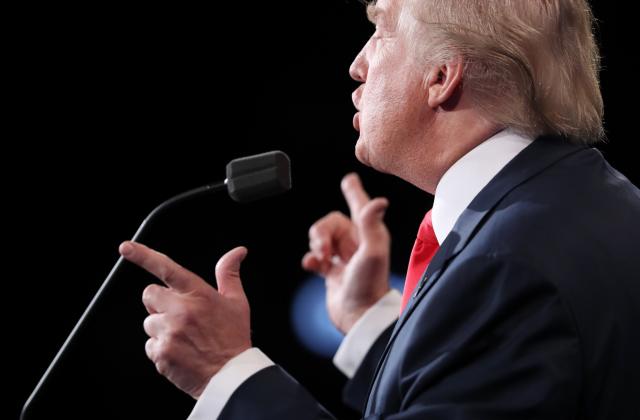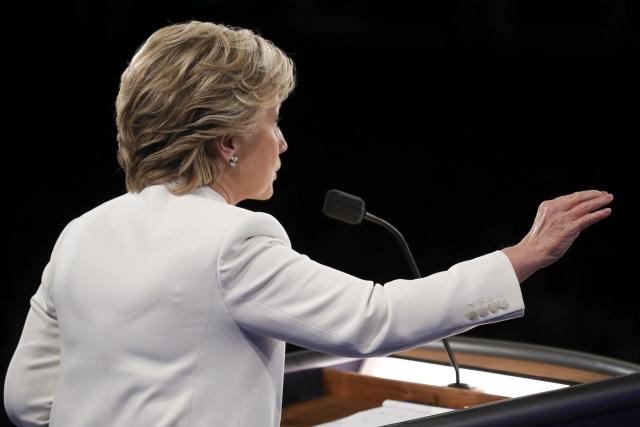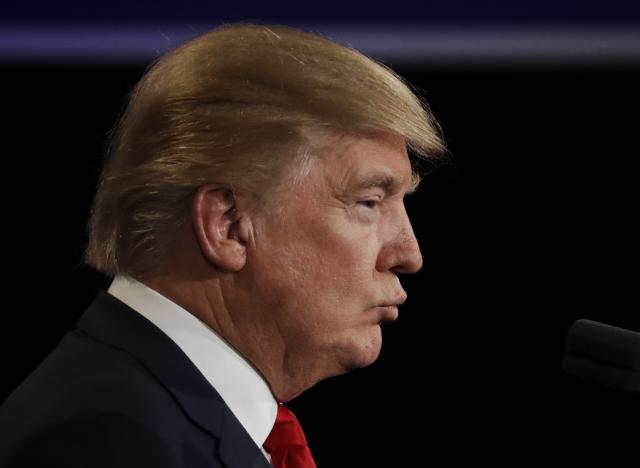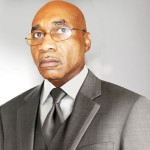He refused to say that he believes the results of the Nov. 8 presidential election will be legitimate
It was disturbing enough that Donald Trump has thrown loose talk around on the campaign trail that he feels the election is going to be rigged against him.
But Wednesday night, in front of a national primetime audience, Trump plunged himself and the Republican Party headfirst into a mess even larger than the one he’s created for the GOP over the past several months, when he refused to say that he believes the results of the Nov. 8 presidential election will be legitimate.
“I’ll look at it at the time,” was all that Trump would say, after being asked multiple times by Fox News’ Chris Wallace, the moderator of the third and final presidential debate.
Trump alleged that there are “millions of people that are registered to vote that shouldn’t be registered to vote” and claimed that this was information coming “from Pew Report and other places.”
He was referring to a report by the Pew Center on the states that have found that “more than 1.8 million deceased individuals are listed as voters.” But as FactCheck.org has noted, “the report did not allege the 1.8 million deceased people actually voted. Rather, Pew said that it is evidence of the need to upgrade voter registration systems.”
And there have been no examples of widespread, orchestrated voter fraud.
Wallace pressed Trump, noting that “there is a tradition in this country — in fact, one of the prides of this country — is the peaceful transition of power and that no matter how hard-fought a campaign is, that at the end of the campaign that the loser concedes to the winner.”
“Are you saying you’re not prepared now to commit to that principle?” Wallace asked Trump.

Trump responded: “What I’m saying is that I will tell you at the time. I’ll keep you in suspense. OK?”
Even Trump’s running mate, Indiana Gov. Mike Pence, and Trump’s own daughter, Ivanka, had said just hours earlier Wednesday that they would accept the election results. Trump could not bring himself to do so.
Conservative columnist Charles Krauthammer, who wondered in a column last week why Trump’s complaints about the election being rigged had not drawn more attention, called the move “political suicide.” Weekly Standard founder Bill Kristol called on House Speaker Paul Ryan, R-Wisc., and Senate Majority Leader Mitch McConnell, R-Ky., to disavow Trump over these comments.
“What should happen: Tomorrow morning @SpeakerRyan & @SenateMajLdr repudiate Trump, make case for GOP Congress to check & balance Clinton,” Kristol tweeted.
Sen. Lindsey Graham, R-S.C., did not wait for long Wednesday night to do just that. “Like most Americans, I have confidence in our democracy and election system,” Graham said in a statement. “Mr. Trump is doing the party and country a great disservice by continuing to suggest the outcome of this election is out of his hands and ‘rigged’ against him. If he loses, it will not be because the system is ‘rigged,’ but because he failed as a candidate.”
There will now be renewed pressure on Ryan to distance himself further from Trump than he did earlier this month, when he told House members he would not campaign with the GOP nominee after the release of a 2005 tape showing Trump bragging about sexually assaulting women.
It’s unlikely that this debate could have changed the trajectory of the race. But it was possible that Trump could have had a solid performance and failed to fuel new fires. And Clinton, for her part, might have chosen to play a fairly passive role in the debate coming into the night, with Trump plummeting in the polls and already written off for dead by many.
Instead, Clinton showed more poise, command and energy than she had in either of the first two debates. While some of her most effective moments came from lines of attack that were obviously rehearsed, she delivered her critiques of Trump with a style and confidence that had been lacking before.

Trump looked deflated and tired. He had a few moments where he pressed the case against Clinton over her use of a private email server and the shoddy work of contractors hired by her family’s foundation to do reconstruction work in Haiti, and he spoke clearly and forcefully on the issue of abortion.
But throughout most of the 90-minute debate — the most substantive and policy-oriented of the three, thanks to the moderator, Fox News’ Chris Wallace — it was Clinton who was on the offensive.
Clinton jumped on Trump early, knocking him for having “choked” in his meeting with Mexican President Enrique Peña Nieto, when Trump failed to bring up his frequent promise that Mexico will pay to have a wall built along the U.S. border.
She hit Trump on his mysterious lack of outrage over the hacking of American government and political figures by what U.S. intelligence believes to be Russian hackers. “You encouraged espionage against our people,” she told Trump, referring to his comment in July that he hoped the Russian government would “find the 30,000 emails” that Clinton deleted from a private server she had installed at her home while she was secretary of state.
Clinton, who often struggles to connect with audiences, also showed genuine emotion at several points: when she compared her 30 years in public life to Trump’s, when she ran through his comments about women who have accused him of unwanted sexual advances and assault and when she responded to his refusal to accept the legitimacy of the U.S. election system.
Clinton noted that in the 1970s, she had been working at the Children’s Defense Fund, “taking on discrimination against African-American kids in schools. He was getting sued by the Justice Department for racial discrimination in his apartment buildings.” She ran through other examples and concluded by noting that “On the day when I was in the situation room monitoring the raid that brought Osama bin Laden to justice, [Trump] was hosting the ‘Celebrity Apprentice.’”
Trump replied simply: “I think I did a much better job. I built a massive company… worth many, many billions of dollars.”
When Wallace asked Trump why nine separate women would have made up stories about Trump touching them inappropriately, Trump simply said the stories were “debunked” and switched to talking about videos released this week by the conservative activist James O’Keefe, in which a Democratic operative named Scott Foval brags about having paid homeless people to disrupt Trump rallies.
Trump blamed violence at one particular rally in Chicago earlier this year on Clinton herself, despite the fact that there is no evidence that Foval ever interacted with the Clinton campaign, or that he even had any involvement with the Chicago rally unrest.
“She’s the one, and Obama, that caused the violence,” Trump said.
Clinton did not address the O’Keefe tapes, which have resulted in Foval being fired from the group Americans United for Change, and instead focused on Trump’s response over the past week or so to the women who have accused him of assaulting them.

“He held a number of big rallies where he said that he could not possibly have done those things to those women because they were not attractive enough for them to be assaulted,” Clinton said.
Trump interjected: “I did not say that. I did not say that.”
Clinton continued: “He went on to say, ‘Look at her. I don’t think so.’ About another woman, he said, ‘That wouldn’t be my first choice,’” she said. “Donald thinks belittling women makes him bigger. He goes after their dignity, their self-worth, and I don’t think there is a woman anywhere who doesn’t know what that feels like.
“That’s who Donald is. I think it’s really up to all of us to demonstrate who we are and who our country is, and to stand up and be very clear about what we expect from our next president,” she said.
Trump’s response? “Nobody has more respect for women than I do. Nobody,” he said. Wallace had to hush the audience’s laughter.
Near the end of the debate, Trump, who is running behind by huge numbers with women of all ages and incomes, raised eyebrows when he interjected, after Clinton took a quick jab at him while she was talking about Social Security, that she was “such a nasty woman.”
And when Trump said he would not promise to accept the outcome of the election, he again attacked Clinton’s use of a private e-mail server, which he said was a “very, very serious crime.” Clinton noted that the Justice Department had found no reason to prosecute her — a decision some think was not well-founded — and focused on Trump’s remarks.
Clinton called Trump’s refusal to accept the American electoral system “horrifying.”
“We’ve been around for 240 years. We’ve had free and fair elections. We’ve accepted the outcomes when we may not have liked them. And that is what must be expected of anyone standing on a debate stage during a general election,” Clinton said.
Her voice rose a level as she said to Trump, “It just shows you’re not up to doing the job.”
“He is denigrating, he’s talking down our democracy. And I, for one, am appalled that somebody who is the nominee of one of our two major parties would take that kind of position,” Clinton said.
Barring some unforeseen chain of events, Clinton is on track to win the presidency, possibly in overwhelming fashion. On Wednesday night in Las Vegas, Trump surprised no one and made it painfully obvious that he is happy to take the party down with him. Clinton did something unexpected, demonstrating that she would not — at least for this one night — just bide her time and hope Trump can’t catch her.


